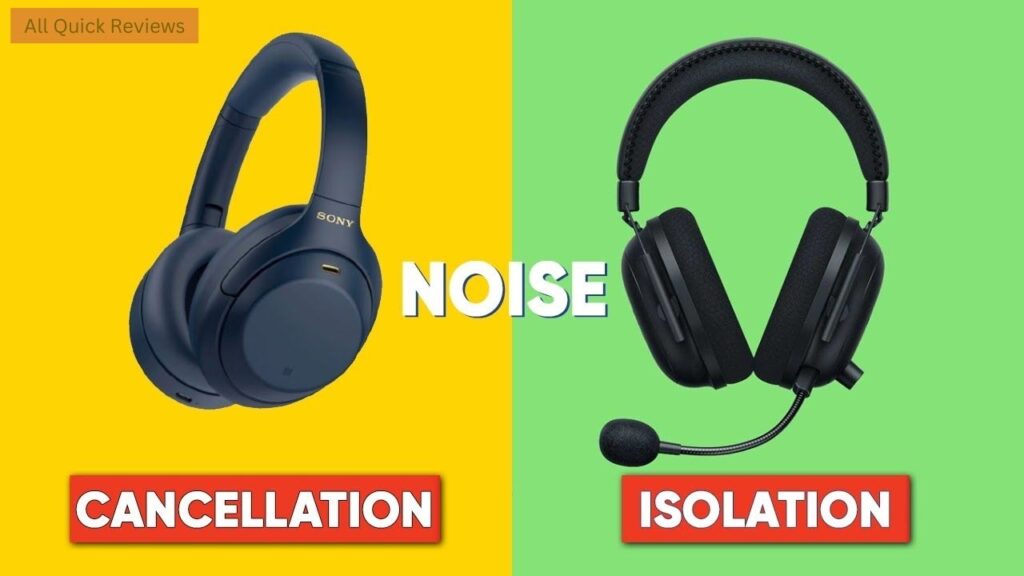
Have you ever wondered about headphones? You know, those cool things you put on your ears to listen to music or watch videos? Well, guess what? There are two special kinds of headphones we need to talk about: headphones noise cancelling vs noise isolating.
First up, let’s talk about noise-canceling headphones. Imagine you’re at a big party, and there’s so much noise around you – people chatting, music playing, and laughter everywhere. Noise-canceling headphones are like magical wizards that help make all that extra noise disappear! They use special tricks to quiet down the sounds around you, so you can enjoy your music or videos without any interruptions. It’s like having a superpower for your ears.
Now, let’s chat about noise-isolating headphones. These headphones are like your own little fortress for your ears. Instead of using magic to make the noise disappear, they have a special design that creates a barrier between your ears and the outside world. It’s like putting up a shield to keep the noise away, so you can have your own private party with just your favorite tunes playing.
Difference Between Noise Cancelling And Noise Isolating:
The main difference between noise-canceling and noise-isolating headphones lies in their approach to dealing with unwanted sounds. Noise-canceling headphones use advanced technology with built-in microphones to detect external noises and then produce sound waves that actively cancel out those noises, creating a quieter environment for the listener. On the other hand, noise-isolating headphones rely on their physical design, such as snug-fitting ear cups or ear tips, to create a passive barrier that blocks out external sounds. While noise-canceling headphones are effective in eliminating a wide range of ambient noises, noise-isolating headphones excel in providing a more straightforward and portable solution without the need for electronic components or batteries. Ultimately, the choice between the two depends on personal preferences, lifestyle, and the specific environments in which you plan to use your headphones.
Features Of Noise-Canceling vs. Noise-Isolating Headphones:
Principle of Operation:
- Noise-Canceling Headphones: These headphones use active noise control (ANC) technology to analyze and counteract external sounds. They have microphones that pick up ambient noise and generate sound waves that cancel out or “neutralize” these unwanted sounds.
- Noise-Isolating Headphones: Noise-isolating headphones, on the other hand, rely on physical barriers to block external sounds. They typically have over-ear or in-ear designs that create a seal around or in your ears, reducing the intrusion of ambient noise.
Effectiveness:
- Noise-Canceling Headphones: Generally effective at reducing low-frequency constant sounds, such as engine hum or air conditioning noise. They are particularly useful in environments like airplanes or offices.
- Noise-Isolating Headphones: Effective across a broader range of frequencies and are often better at blocking sudden, sharp sounds. They can be beneficial in various environments, including crowded spaces and public transportation.
Power Requirement:
- Noise-Canceling Headphones: Typically require a power source (batteries or rechargeable) to operate the active noise-canceling feature. Some newer models have a passive mode allowing use without noise-canceling if the battery is depleted.
- Noise-Isolating Headphones: Do not require additional power for noise isolation. They function passively by physically blocking external sounds.
Sound Quality:
- Noise-Canceling Headphones: The active components may impact sound quality slightly. Some premium models, however, offer excellent audio quality despite the noise-canceling functionality.
- Noise-Isolating Headphones: Generally considered to provide better overall sound quality, as they don’t rely on electronic processing to achieve noise reduction.
Portability:
- Noise-Canceling Headphones: May be bulkier due to the built-in electronics, especially those with over-ear designs. However, foldable and compact models are widely available.
- Noise-Isolating Headphones: Often more compact and lightweight, making them easier to carry and suitable for active use.
Price:
- Noise-Canceling Headphones: Generally more expensive, especially for high-end models with advanced features.
- Noise-Isolating Headphones: Available at various price points, including budget-friendly options with good performance.
Use Case:
- Noise-Canceling Headphones: Ideal for frequent travelers, commuters, or individuals working in noisy environments where constant background sounds need reduction.
- Noise-Isolating Headphones: Suitable for those who prioritize overall sound quality and want effective noise reduction without relying on electronic components. They are versatile for various settings.
Pros And Cons Of Headphones Noise Cancelling vs Noise Isolating:
Choosing between noise-canceling and noise-isolating headphones can be tricky. Both offer sound reduction, but they achieve it in different ways, each with its own advantages and disadvantages. Here’s a breakdown to help you decide:
Noise-Canceling Headphones:
Pros:
- Superior noise reduction: Actively cancels out a wider range of frequencies, including low-frequency rumbles like airplane engines and traffic noise.
- More adaptable: Adjustable noise cancellation levels to suit your environment and preferences.
- Transparency mode: Allows you to hear ambient sounds when needed, crucial for safety in some situations.
- Often come with additional features: Like Bluetooth connectivity, touch controls, and voice assistant integration.
Cons:
- Expensive: Generally cost more than noise-isolating headphones.
- Bulky and heavier: Less comfortable for long-term wear, especially over-ear models.
- Battery-powered: Requires charging, so they’re useless when the battery dies.
- Can introduce white noise: Some users find the constant hum of noise cancellation fatiguing.
Noise-Isolating Headphones:
Pros:
- Affordable: Typically more budget-friendly than noise-canceling options.
- Lightweight and comfortable: Smaller and lighter, ideal for long listening sessions.
- Passive noise reduction: No batteries needed, always work regardless of charge.
- More natural sound: No white noise or potential audio processing artifacts.
Cons:
- Less effective noise reduction: Primarily blocks out high-frequency sounds, like voices and chatter, but struggles with low-frequency rumble.
- Fixed noise reduction: No adjustability, so performance is consistent but may not be ideal for all environments.
- No transparency mode: Can be isolating to the point of being unsafe in some situations.
- Fewer features: Usually lack the bells and whistles of noise-canceling headphones.
Conclusion:
In the battle of headphones Noise Cancelling vs Noise Isolating, the winner ultimately depends on your preferences and lifestyle. Are you a frequent flier seeking serenity in the sky? Perhaps noise-canceling is your go-to. Or maybe you’re a daily commuter who values simplicity and reliability – noise-isolating might be the perfect fit. The choice between noise-canceling and noise-isolating headphones depends on individual preferences, intended use, and budget considerations. Noise-canceling headphones excel in reducing constant background noise, while noise-isolating headphones offer effective isolation across a broader range of frequencies.
Faqs:
Q: What is the main difference between noise-canceling and noise-isolating headphones?
A: Noise-canceling headphones actively reduce external noise by using microphones and advanced technology to produce sound waves that cancel out incoming sounds. Noise-isolating headphones, on the other hand, create a passive physical barrier to block out noise, often through a snug-fitting design or ear tips.
Q: Do noise-canceling headphones require batteries or power sources?
A: Yes, typically. Noise-canceling headphones need a power source, usually a built-in battery, to operate the electronic components that cancel out external noise. In contrast, noise-isolating headphones are generally passive and do not require batteries.
Q: Which is better for travel – noise-canceling or noise-isolating headphones?
A: Noise-canceling headphones are often preferred for travel, especially in noisy environments like airplanes, as they actively eliminate a broader range of sounds. However, some travelers may find noise-isolating headphones more convenient due to their lightweight and battery-free design.
Q: Are noise-canceling headphones more expensive than noise-isolating headphones?
A: In general, yes. Noise-canceling headphones tend to be pricier due to the advanced technology involved. Noise-isolating headphones, being simpler in design, are often more budget-friendly
